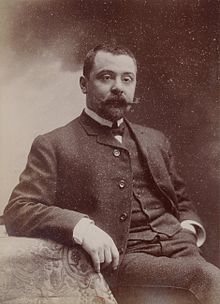Élie Faure
Élie Faure (born April 4, 1873 in Sainte-Foy-la-Grande as Jacques Élie Paul Faure , † October 29, 1937 in Paris ) was a French doctor, art historian and essayist . He is the author of the monumental work Histoire de l'art (in English : History of Art ), which is still a popular reference work among art historians. He also wrote a variety of philosophical and historical works, including a book published in 1921 on Napoléon Bonaparte .
family
Élie Faure's parents were the wine merchant Pierre Faure (1834-1910) and Suzanne Louise Zéline Reclus (1836-1911), a sister of the geographer and anarchist Élisée Reclus , the ethnologist Élie Reclus and the surgeon Paul Reclus . His maternal grandfather was Pastor Jacques Reclus . On April 7, 1896, Élie Faure married Suzanne Gilard (1870-1958), daughter of the pastor of Eynesse ; they had four children together:
- François Faure (1897–1982), member of the Resistance
- Elisabeth Faure (* 1898)
- Jean-Pierre Faure (1900-1991)
- Marie-Zéline Faure (* 1904), called Zizou
Works
- Vélasquez (1903)
- Formes et Forces (1907)
- Les Constructeurs (1914)
- La sainte Face (1917)
- La Roue (1919)
- La Danse sur le Feu et l'Eau (1920)
- Napoléon (1921)
- Histoire de l'art (1919–1921)
- L'Esprit des formes (1927)
- Mon périple suivi de Reflets dans le sillage (1931)
- Découverte de l'archipel (1932)
- D'autres Terres en vue (1932)
- Rudolf Kremlička . Malířské konfese , Musaion 6, Aventinum
Web links
- Longer biography (fr.)
- Short biography with photo of Faure (fr.)
- Further biography of Faure (fr.)
| personal data | |
|---|---|
| SURNAME | Faure, Élie |
| ALTERNATIVE NAMES | Faure, Jacques Élie Paul (full name) |
| BRIEF DESCRIPTION | French doctor, art historian and essayist |
| DATE OF BIRTH | April 4, 1873 |
| PLACE OF BIRTH | Sainte-Foy-la-Grande |
| DATE OF DEATH | October 29, 1937 |
| Place of death | Paris |
